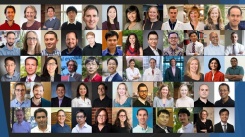Dr. Gordon Receives NIH New Innovator Award
http://news.vumc.org/2018/10/02/gordon-receives-2-3-million-nih-directors-new-innovator-award/
Dr. Gordon has received a highly competitive New Innovator award, part of the NIH’s High-Risk, High-Reward Research program, given to exceptionally creative scientists proposing to use highly innovative approaches to tackle major challenges in biomedical research. “I am honored and thrilled to be a New Innovator recipient, as this particular project really speaks to my professional mission to work across disciplinary boundaries to enhance our understanding of how and why musicality is related to brain development and human health,” Gordon said.
Biology and the Beat
Vanderbilt Medicine Magazine
https://medschool.vanderbilt.edu/vanderbilt-medicine/biology-and-the-beat/
“We are looking at really broad factors of how we can use music and study music to impact social engagement, emotional well-being and community inclusion for individuals both with and without autism and other developmental disabilities,” said Lense, who is the principal investigator in the studies. “We are bringing together people with different areas of expertise to bring new perspectives to the field of music cognition.”
Our rhythm research appears in The Amazing Human Body: Learn Episode (BBC/PBS)
PBS/BBC
https://www.pbs.org/program/amazing-human-body/
We were featured in the Learn Episode of the Human Body program; our segment starts at 14:40.
Special thanks to Sara Beck, Allison Aaron, Natalie Wiens, Kate Margulis, Emelyne Bingham and Sara Johnson for making this filming a success!
Music, Mind and Society Program Growing Fast
Country Music And Brain Research Come Together At Nashville Summer Camp
Emily Siner
http://www.npr.org/sections/health-shots/2017/07/31/540553819/country-music-and-brain-research-come-together-at-nashville-summer-camp
Speaking to Emily Siner on NPR's All Things Considered, Dr. Miriam Lense discusses the intersection of neuroscience research and country music at Vanderbilt University's Williams syndrome camp for individuals with Williams syndrome. A clinical scientist with research and clinical expertise working with individuals with Williams syndrome and other neurodevelopment disorders, Dr. Lense aims to better understand the social, cognitive, and affective processes of these individuals through the approaches of auditory neuroscience/music cognition and stress biology.
Using Music And Rhythm To Help Kids With Grammar And Language
A Musical Awakening
Alexander Chern, M.D. candidate
https://my.vanderbilt.edu/universityfundingprograms/2017/05/a-musical-awakening/
About a year ago, in a crosswalk at the corner of Natchez and Blakemore, I was hit by a car. I was hospitalized for a month after sustaining a traumatic brain injury (TBI) and other serious injuries. When I woke from my coma, the first thing I remember was asking my mother for my computer. I went on YouTube and listened to Beethoven’s Sixth Symphony, the Pastoral Symphony.
Music Cognition as a Window into Development
Miriam Lense, PhD, Research Instructor, Department of Otolarygology
https://my.vanderbilt.edu/universityfundingprograms/2017/04/music-cognition-as-a-window-into-development/
Twin A wailed as the nurse administered the heel stick. His heart rate jumped up nearly 70 beats per minute and he tightly squeezed his eyes shut. Nine weeks premature, he endured painful heel sticks and neurologic examinations as part of his daily routine. He was certainly not desensitized to the poking and prodding. When the nurse was finished, I turned on the speaker, letting lullabies softly play into the isolette. His heart rate declined to baseline and the music soothed him to sleep.
The Rhythm of Research in the Music Cognition Lab
Genevieve Kupsky
https://my.vanderbilt.edu/universityfundingprograms/2017/03/the-rhythm-of-research-in-the-music-cognition-lab/
The world of pre-meds at Vanderbilt is unforgiving, lonely and at times unrewarding. It is a community of students with the determination of steel and a “do it or die trying” attitude. “All I have to do is beat the curve” is the mantra of many as we prepare for battle against our peers in pursuit of the A’s that are only given to 10 percent of the class. Amidst this harsh and cutthroat environment, I have found an oasis that has reminded me of my love for science once again—the Music Cognition Lab.
Can music training improve language outcomes in children? Program for Music, Mind and Society provides violin lessons for children with language impairments
Natalie Wiens
https://my.vanderbilt.edu/universityfundingprograms/2017/02/can-music-training-improve-language-outcomes-in-children-program-for-music-mind-and-society-provides-violin-lessons-for-children-with-language-impairments/
It’s late afternoon and the sun is slanting through the window. Four violins, three children, three parents and one teacher are gathered in a room. As the teacher plays a series of rhythmic notes on her violin, the children imitate and the parents encourage. Soon we see the children initiate and the teacher adapts. This transactional model of learning seems to transcend traditional verbal instruction. Good thing, too, because these three children have a disorder called specific language impairment (SLI).








